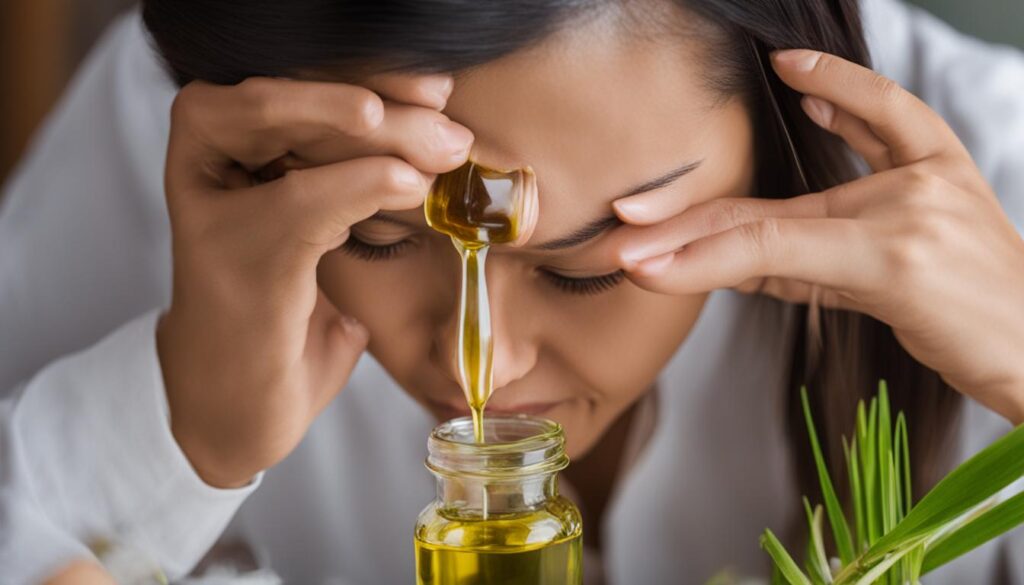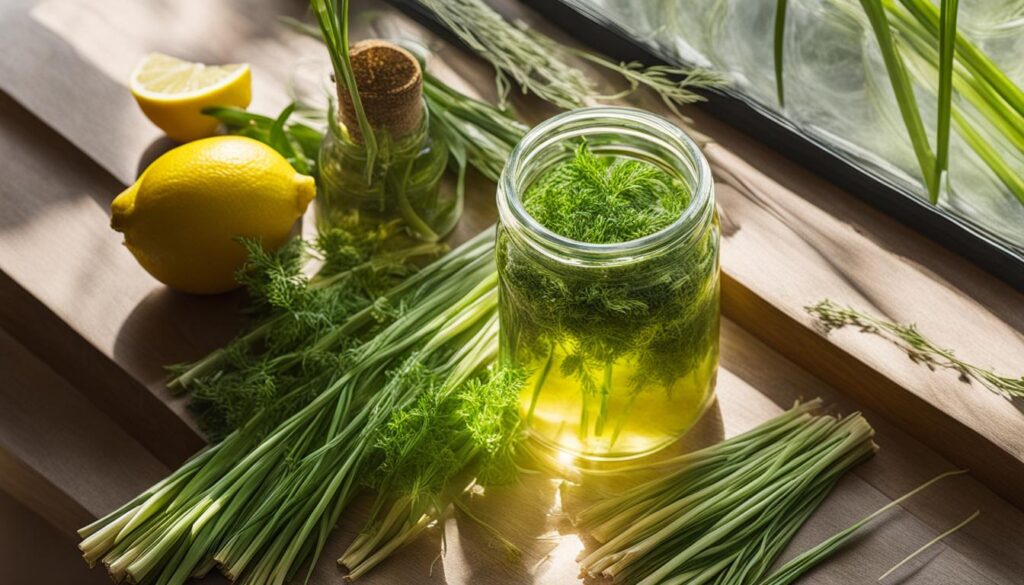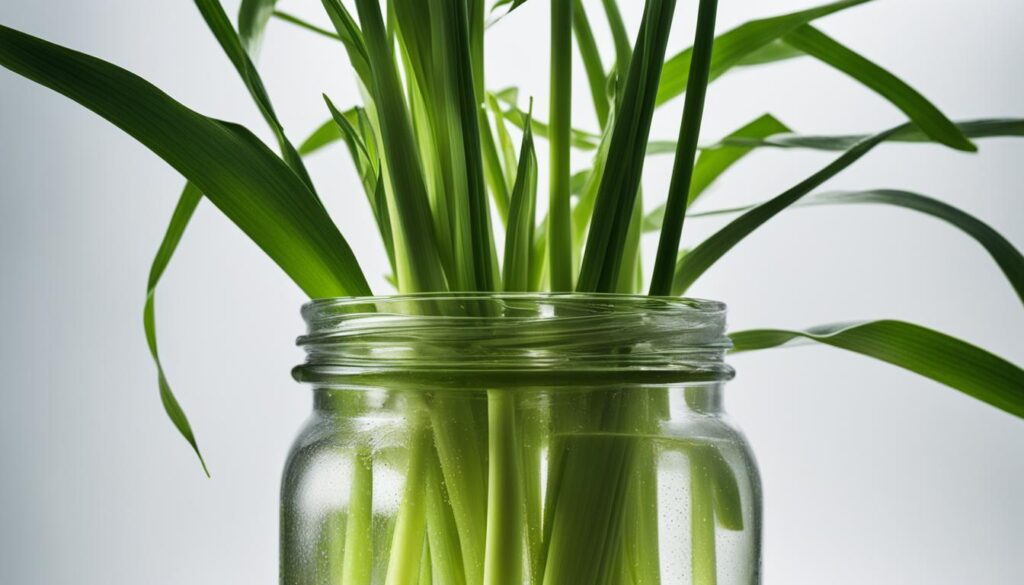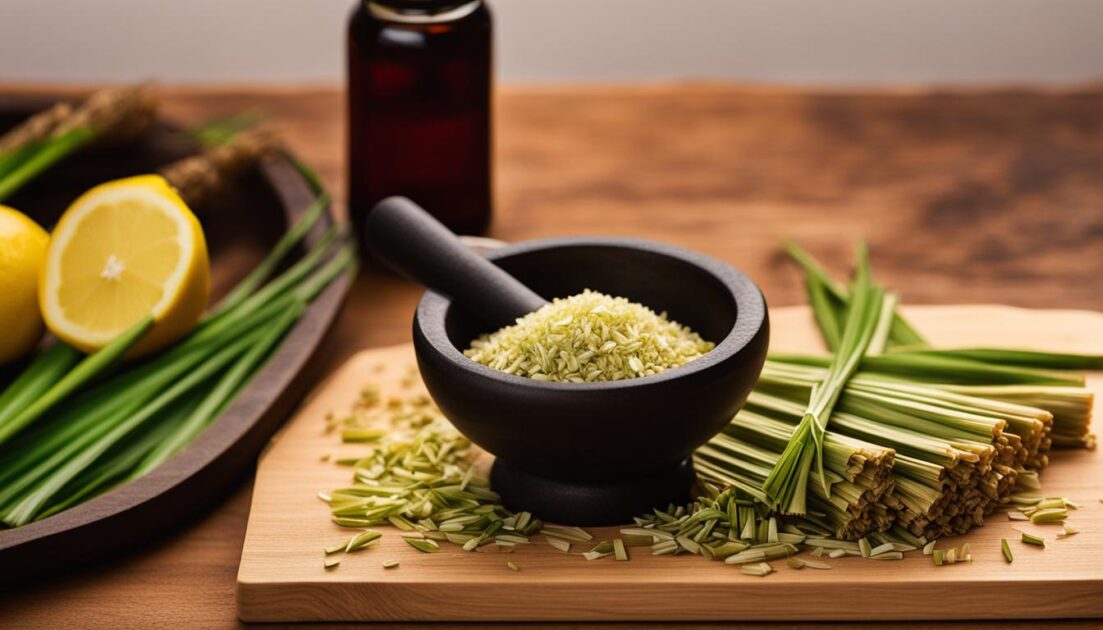Lemongrass oil is a versatile oil that has many benefits and uses. It can be used to repel mosquitoes, soothe skin irritations, and promote relaxation. Making lemongrass oil at home is a simple and cost-effective process that requires fresh lemongrass stalks, a neutral oil as a base, and some basic tools. There are two common methods of extraction: cold infusion and hot infusion. Both methods are effective and produce high-quality lemongrass oil.
Key Takeaways:
- DIY lemongrass oil can be made at home using fresh lemongrass stalks and a neutral oil as a base.
- Cold infusion and hot infusion are two common methods of extracting lemongrass oil.
- Lemongrass oil has multiple uses, including repelling mosquitoes, soothing skin irritations, and promoting relaxation.
- It is important to take necessary precautions when making lemongrass oil, such as rinsing with cold water if it comes into contact with the eyes or mouth.
- Lemongrass oil has various benefits for hair and skin, including treating dandruff, strengthening hair follicles, and addressing skin conditions like acne.
What is Lemongrass?
Lemongrass is a tropical plant native to regions such as Africa, Asia, and America. Known for its pleasant fresh fragrance, it is widely used for various purposes. Lemongrass is commonly used as a natural medicine to address skin issues and as a spice in many cuisines. However, one of the most popular applications of lemongrass is the production of its essential oil.
Lemongrass essential oil offers numerous benefits and is highly valued for its versatile properties. This oil is known for its antibacterial and antifungal properties, making it effective in killing harmful bacteria and fungi. Additionally, it has anti-inflammatory effects, which can help reduce inflammation and ease discomfort. Lemongrass oil also has the ability to improve sleep and promote relaxation.
In addition to its therapeutic benefits, lemongrass oil is extensively used in beauty care products such as creams, lotions, and shampoos. Its invigorating scent and potent properties make it a valuable ingredient in various skincare and haircare formulations.
Overall, lemongrass is a remarkable plant that offers a wide range of benefits. From homemade lemongrass oil to its diverse applications in beauty care, this plant has garnered attention for its remarkable contributions to natural health and wellness.

Lemongrass Oil Benefits
The rich composition of lemongrass oil provides numerous benefits for overall well-being. Here are some key advantages of using lemongrass oil:
| Benefits | Explanation |
|---|---|
| Antibacterial | Effective in killing bacteria and preventing infections. |
| Antifungal | Helps combat fungal infections and promote healthy skin and nails. |
| Anti-inflammatory | Reduces inflammation and eases discomfort. |
| Promotes relaxation | Has a calming effect, aids in stress reduction, and improves sleep quality. |
| Improves digestion | Facilitates digestion and relieves gastrointestinal issues. |
| Antioxidant | Fights against free radicals and protects the body from oxidative stress. |
These benefits highlight the significant impact lemongrass oil can have on various aspects of health and well-being. Whether used topically, in aromatherapy, or as an ingredient in personal care products, lemongrass oil offers a natural and effective solution for a range of concerns.
How to Make Lemongrass Essential Oil at Home?
If you want to experience the benefits of lemongrass oil without breaking the bank, making it at home is a great option. With just a few ingredients and a little bit of time, you can produce your own high-quality lemongrass oil. Here’s how:
- Gather fresh lemongrass stalks and a neutral oil as a base.
- Prepare dark glass jars for storage.
- Choose one of the two common extraction methods: cold infusion or hot infusion.
Cold Infusion Method:
In this method, you will combine mashed lemongrass stalks with the oil and let them ferment in sunlight for a few days. Here are the steps:
- Mash the lemongrass stalks to release the oils.
- Combine the mashed lemongrass stalks with the neutral oil in a glass jar.
- Place the jar in an area where it will receive direct sunlight.
- Allow the mixture to ferment for a few days, stirring occasionally.

Hot Infusion Method:
If you prefer a quicker extraction process, the hot infusion method is ideal. Follow these steps:
- Chop the lemongrass stalks into small pieces.
- Heat the neutral oil in a double boiler or a slow cooker.
- Add the chopped lemongrass stalks to the oil.
- Allow the mixture to infuse for several hours on low heat.
Both methods will yield high-quality lemongrass oil that can be stored in dark glass jars for up to 12 months. Remember to strain the oil before transferring it to the jars to remove any solid particles.
Now that you know how to make lemongrass essential oil at home, you can enjoy its refreshing scent and numerous benefits without the hefty price tag.
Precautions
When making lemongrass oil at home, it is essential to take necessary precautions to ensure safety and maximize the benefits of this natural oil. Lemongrass oil extraction can be a rewarding process, but it is important to handle the oil with care and be aware of potential risks.
Protect Your Skin and Eyes
Lemongrass oil can be irritating to the skin, especially if used in its concentrated form. To minimize the risk of irritation, it is recommended to dilute the oil before applying it to the skin. If any oil comes into contact with your eyes or mouth, rinse thoroughly with cold water. Taking this precautionary step can help prevent discomfort and ensure a positive experience with lemongrass oil.
Keep Children Away
During the oil preparation process, it is crucial to keep children away to avoid any accidents or ingestion of the oil. Lemongrass oil should never be ingested by children or adults without proper guidance from a healthcare professional. It is always recommended to store the oil out of the reach of children to ensure their safety.
Choose the Right Storage Containers
The proper storage of lemongrass oil is crucial to maintain its potency and effectiveness. It is vital to use dark glass bottles or jars for storing the oil. This is because sunlight can degrade the quality of the oil and reduce its benefits. Dark glass containers help protect the oil from harmful UV rays, ensuring its longevity and preserving its therapeutic properties.
Perform a Patch Test
Before using lemongrass oil on your skin, it is always advisable to perform a patch test to check for any adverse reactions. Apply a small amount of diluted lemongrass oil to a small area of your skin and observe for any signs of irritation or allergic reactions. If no adverse effects occur within 24 hours, it is generally safe to use the oil on a larger area of your body.

| Precautions for Making Lemongrass Oil at Home |
|---|
| Protect Your Skin and Eyes |
| Keep Children Away |
| Choose the Right Storage Containers |
| Perform a Patch Test |
Lemongrass Oil Uses
Homemade lemongrass oil offers a wide range of uses that make it a valuable addition to your natural remedies and beauty care routines. Here are some popular ways to use lemongrass oil:
- As a natural insect repellent: Lemongrass oil contains citronella, a natural compound known for its insect-repelling properties. Dilute a few drops of homemade lemongrass oil with water or a carrier oil and apply it to your skin to keep mosquitoes and other insects at bay.
- As a remedy for skin issues: Lemongrass oil has antimicrobial and anti-inflammatory properties, making it effective in treating skin conditions like acne, rashes, and minor skin irritations. Apply a small amount of diluted lemongrass oil topically to affected areas for relief.
- In beauty care products: Lemongrass oil can be incorporated into homemade beauty care products such as creams, lotions, and shampoos. Its refreshing aroma and skin-enhancing properties make it a popular choice for promoting healthy hair and skin.
- For aromatherapy: The invigorating scent of lemongrass oil can help reduce stress, promote relaxation, and uplift your mood. Add a few drops of homemade lemongrass oil to a diffuser or mix it with carrier oil for a relaxing massage oil.
- For cooking (with caution): While lemongrass is commonly used in cooking, it’s important to note that the essential oil should only be used sparingly and with caution. It should not be ingested in large quantities due to its concentrated nature.
Remember to always perform a patch test before using lemongrass oil on your skin and consult with a healthcare professional or aromatherapist for specific guidance on usage and dilution ratios.
Benefits of Lemongrass Oil
Lemongrass oil offers a range of remarkable benefits due to its natural medicinal properties:
“Lemongrass oil has antibacterial, antifungal, and anti-inflammatory properties, making it a versatile and valuable addition to your homemade essential oil collection.”
When used properly, lemongrass oil can help:
- Combat bacterial and fungal infections
- Reduce inflammation and pain
- Promote relaxation and reduce stress
- Improve sleep quality
- Act as a powerful antioxidant
- Aid in digestion and relieve nausea
With its myriad of benefits, lemongrass oil is a natural and potent tool for supporting your overall well-being.
Lemongrass Oil Benefits
Lemongrass oil is a powerful essential oil that offers a wide range of benefits. Its antibacterial, antifungal, and anti-inflammatory properties make it effective in treating various skin infections and inflammations. Whether you’re dealing with acne, eczema, or minor cuts and wounds, applying homemade lemongrass oil can help soothe and heal your skin.
In addition to its therapeutic effects on the skin, lemongrass oil can also act as a natural pain reliever. Its analgesic properties make it useful for alleviating headaches, muscle aches, and joint pain. Simply massage a few drops of the oil onto the affected area to experience its soothing effects.
Lemongrass oil is well-known for its calming and relaxing properties. By inhaling its refreshing scent or using it in aromatherapy, you can reduce stress, anxiety, and tension. This makes it a valuable addition to your self-care routine or a great oil to diffuse in your living space to create a calm and serene atmosphere.
Furthermore, lemongrass oil is a powerful antioxidant that helps protect your body against harmful free radicals. Free radicals are unstable molecules that can cause oxidative stress and damage to your cells. By incorporating lemongrass oil into your homemade essential oil collection, you can enhance your body’s defense against oxidative damage and promote overall well-being.
Additionally, lemongrass oil has been found to have digestive and nausea-relieving properties. It can help ease indigestion, bloating, and stomach discomfort. By diluting the oil and applying it topically or inhaling its aroma, you can alleviate these digestive issues and promote a healthy digestive system.
“Lemongrass oil is a versatile and valuable essential oil that offers antibacterial, antifungal, and anti-inflammatory benefits. Its soothing and calming properties make it an excellent addition to your skincare routine, while its antioxidant effects help protect your body from harmful free radicals. Whether you’re looking to improve your skin health, alleviate pain and stress, or support digestion, lemongrass oil is a natural solution worth exploring.” – [Expert Name], Certified Aromatherapist
Lemongrass Oil for Hair and Skin
Lemongrass oil offers numerous benefits for both hair and skin. When it comes to hair care, lemongrass oil is known to effectively treat dandruff, strengthen hair follicles, and promote hair growth. Its natural properties have the ability to address scalp issues and prevent hair fall, making it a popular choice for those looking to improve the health and appearance of their hair.
For skin care, lemongrass oil can be particularly helpful in treating various skin conditions such as acne, rashes, and skin irritations. Its anti-inflammatory and antimicrobial properties can help soothe and heal the skin. Additionally, lemongrass oil has moisturizing qualities that can leave the skin soft, supple, and rejuvenated.
When using lemongrass oil for hair and skin, it is important to dilute it properly before application. Undiluted essential oils can be too strong and may cause skin irritation. It is recommended to mix a few drops of lemongrass oil with a carrier oil, such as coconut oil or jojoba oil, before applying it to the hair or skin. Performing a patch test beforehand is also advisable to check for any adverse reactions.
| Benefits | Hair | Skin |
|---|---|---|
| Treats dandruff | ✓ | – |
| Strengthens hair follicles | ✓ | – |
| Promotes hair growth | ✓ | – |
| Addess scalp issues | ✓ | – |
| Prevents hair fall | ✓ | – |
| Treats acne | – | ✓ |
| Soothes rashes | – | ✓ |
| Relieves skin irritations | – | ✓ |
| Moisturizes the skin | – | ✓ |
Lemongrass Oil in Aromatherapy
Lemongrass oil is a popular choice for aromatherapy due to its numerous benefits and refreshing scent. When used in aromatherapy, lemongrass oil can promote relaxation, reduce stress, and improve sleep. Its invigorating aroma helps create a calming environment and enhances overall well-being.
To enjoy the benefits of lemongrass oil in aromatherapy, you can diffuse it using an essential oil diffuser. Simply add a few drops of the oil to the diffuser and let the soothing scent fill the room. Alternatively, you can add a few drops of lemongrass oil to your bath water for a soothing and aromatic experience.
It is important to use lemongrass oil sparingly in aromatherapy and follow proper dilution guidelines. Essential oils are highly concentrated and should be used with caution. Always read the instructions and consult a professional if needed to ensure the safe and effective use of lemongrass oil in aromatherapy.
FAQ
How to make lemongrass oil at home?
To make lemongrass oil at home, you will need fresh lemongrass stalks, a neutral oil as a base, and dark glass jars for storage. There are two common methods of extraction: cold infusion and hot infusion. Both methods result in high-quality lemongrass oil that can be stored in dark glass jars for up to 12 months.
What is lemongrass?
Lemongrass is a tropical plant that has a pleasant fresh fragrance and is commonly used as a natural medicine for various skin issues and as a spice in many cuisines. The essential oil derived from lemongrass has numerous benefits and uses.
How to make lemongrass essential oil at home?
To make lemongrass essential oil at home, you will need fresh lemongrass stalks, a neutral oil as a base, and dark glass jars for storage. There are two common methods of extraction: cold infusion and hot infusion. Both methods result in high-quality lemongrass oil.
What precautions should I take when making lemongrass oil at home?
It is important to take necessary precautions when making lemongrass oil at home. The oil can be irritating to the skin, so it is recommended to rinse with cold water if it comes into contact with the eyes or mouth. It is also important to keep children away from the oil preparation process.
What are the uses of lemongrass oil?
Homemade lemongrass oil has a variety of uses. It can be used as a natural insect repellent, a natural remedy for skin issues, and in beauty care products. Lemongrass oil can also be used for aromatherapy to promote relaxation and reduce stress.
What are the benefits of lemongrass oil?
Lemongrass oil has numerous benefits. It has antibacterial, antifungal, and anti-inflammatory properties, making it effective in treating skin infections and inflammations. It can also act as a natural pain reliever and promote relaxation. Additionally, lemongrass oil is a powerful antioxidant and can help fight against free radicals.
How can lemongrass oil be used for hair and skin?
Lemongrass oil can be beneficial for both hair and skin. For hair, it can help treat dandruff, strengthen hair follicles, and promote hair growth. For skin, lemongrass oil can help with various skin conditions like acne, rashes, and skin irritations. It can also make the skin soft and supple.
How can lemongrass oil be used in aromatherapy?
Lemongrass oil can be used in aromatherapy to promote relaxation, reduce stress, and improve sleep. Its refreshing scent can help create a calming environment and enhance overall well-being. It can be diffused using an essential oil diffuser or added to bath water for a soothing and aromatic experience.






